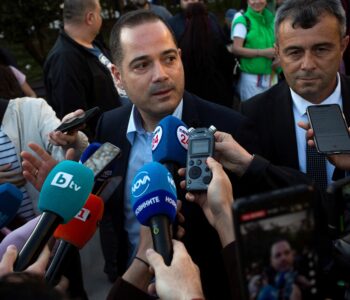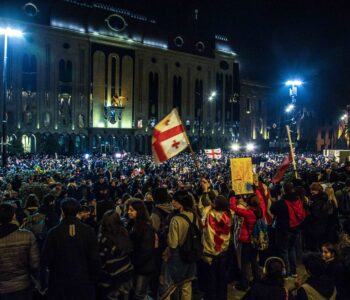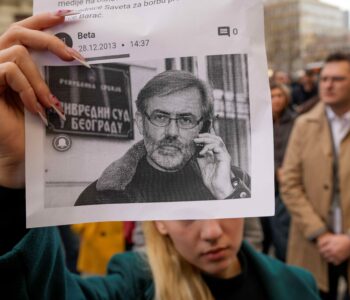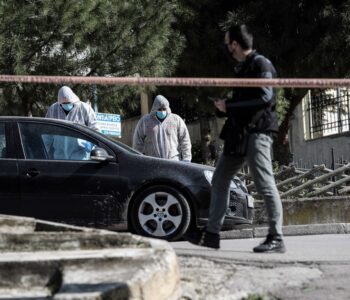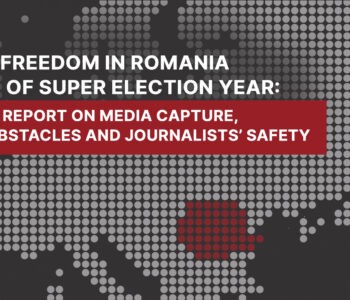A group of journalists and activists took to the streets in Tirana to voice their indignation against the arrogance of power and the ongoing attempts to limit press freedom in the country.
Investigative journalist Aurora Velaj urged her colleagues to gather in front of the Prime Minister’s office, reiterating the growing danger to press freedom in the country and the importance of being present in solidarity also for those who, for fear of repercussions at work, cannot actively participate.
Socialist Prime Minister Edi Rama has come under accusation for attacking journalist Ambrozia Meta, who was rejected with an angry gesture from Rama, just before the latter abruptly left a group of journalists gathered to collect the his statements.
What made the Prime Minister nervous were the journalist’s pressing questions about an investment project on the Albanian coast by Jared Kushner, and the accusations of favoritism linked to his family connection with Donald Trump and his previous position as advisor at the White House.
Together with the controversial construction project of the Gaza seafront, Kushner’s company has also planned the construction of 10,000 housing units also on the Albanian island of Saseno, a protected area until a few weeks ago.
While Rama dismissed the incident as an “imaginary assault”, refusing to issue an apology, Meta expressed her disappointment, underlining the Prime Minister’s chronic arrogance towards journalists.
In fact, the episode is certainly not isolated, as already in 2022 Rama had temporarily denied Ambrozia Meta access to his press conferences. On another occasion, when Meta asked a question at a press conference about a socialist MP arrested for corruption, the Prime Minister responded by suggesting a period of “re-education” for her, once again avoiding addressing the issue directly.
In a similar story, journalist Kelvin Muka was excluded from press conferences after asking the Prime Minister to comment on a case of conflict of interest of then Foreign Minister Olta Xhacka, whose spouse had been awarded a strategic investment project, again a luxury resort on the coast of southern Albania.
The director of the NGO Citizen Channel, Lorin Kadiu, present at the demonstration, told OBCT that the use of intimidating language, including sometimes inappropriate gestures, has become an ordinary reaction when the Albanian Prime Minister is called to account for inconvenient matters of particular public interest.
“For me, this protest represents an act of rebellion on the part of journalists, who have been prevented from carrying out their role properly”, commented Kadiu.
Beyond Rama: attacks against journalists become a widespread trend in Albanian politics
Hostility towards journalists in Albania is not limited to the Prime Minister. In recent months, the mayor of Tirana, Erion Veliaj, has come under criticism for his denigration of investigative journalist Ola Xama. After reporting for the Balkan Investigative Journalism Network (BIRN) on the mayor’s alleged involvement in a serious case of corruption over waste management, Xama was defined by Veliaj as a “militant” and “hired killer”.
The statements were followed by a broader smear campaign, culminating in recent weeks with several news sites close to the government publishing articles characterised by a concerning level of sexist verbal violence, including online harassment, aimed at Xama and her family, “slut-shaming”, and the disclosure of the journalist’s home address.
As journalist Isa Myzyraj highlighted in his speech at the event, many politicians have adopted the disparaging language used by national leaders against the press.
In fact, in recent days, the socialist mayor of the peripheral city of Rrogozhine, upon hearing the news that he was being investigated for vote-buying, harshly attacked the media, taking up an expression used by Premier Rama who defined them as “rubbish bins”.
“The Prime Minister’s language towards journalists has become alarming in recent years, but now it has also reached the point of physical gestures, putting journalists at risk in their daily work. On the other hand, the institutions must shed light on every case of intimidation, since every action against journalists is an act against freedom of the press”, tells us Myzyraj, a young journalist with an ongoing defamation lawsuit brought by the former chief prosecutor of Tirana, now removed from the judiciary following the judicial reform, and a recent anti-Semitic and homophobic death threat, received via email to the editorial staff.
“This protest is first and foremost about the safety of journalists. In Albania, journalists are not safe” – concludes Myzyraj.
Albania lags behind in Europe and the Balkans
The climate of media intimidation in Albania has attracted criticism from international observers, with Reporters Without Borders placing Albania second to last in Europe and last in the Western Balkans in 2023 in terms of press freedom.
The organisation found that journalists face threats from organised crime, suffer frequent political attacks aimed at discrediting them and face obstacles in accessing public information held by the government.
The most recent EU report confirmed that the intersection of economic and political interests, combined with intimidation and precarious working conditions, continues to undermine media independence and the quality of journalism, while the atmosphere characterised by verbal and physical attacks, smear campaigns and reckless lawsuits against journalists has not improved.
The power of propaganda: news media as a tool of government
According to BIRN, the Albanian government has achieved unprecedented levels of control over the media in the country. The most recent Media Ownership Monitor revealed that the media market in Albania, where the boundaries between media, politics and economics have always been blurred, remains highly concentrated.
The top four owners in the Albanian television market reach audiences between 48.93% and 58.60%. The incessant attacks against critical journalists or the Prime Minister’s gesture towards Ambrozia Meta represent only the surface of an oppressive policy implemented by the government to limit freedom of expression.
Gjergj Erebara, editor of BIRN Albania, explains to OBCT that defining the media as simply biased or mere instruments of government propaganda would be a euphemistic underestimation of reality.
“They are rather 120% under the thumb of government propaganda and disinformation”, says Erebara, without hiding the regret that while the journalists were protesting, the media they work for did not report the demonstration.
A context that leaves journalists powerless in their role as public informants and even when they manage to inform citizens, after overcoming censorship and economic threats, they become easy targets of personal attacks.
“And you can’t help but notice how the attacks are also gendered. In a country where sexism and homophobia are widespread phenomena, female journalists who dare to tell the truth are labeled as whores, while critical journalists are labelled as homosexuals by government media”, adds Erebara.
These behaviors do not only reinforce already rooted prejudices and discrimination, but perpetuate a culture of intimidation that becomes an obstacle to women’s participation in public life.
“In short, in a media landscape where the owners, complicit in political corruption, control every voice, the few journalists who remain faithful to ethical principles and the defence of fundamental human values become targets of the worst possible attacks”, concludes Erebera.
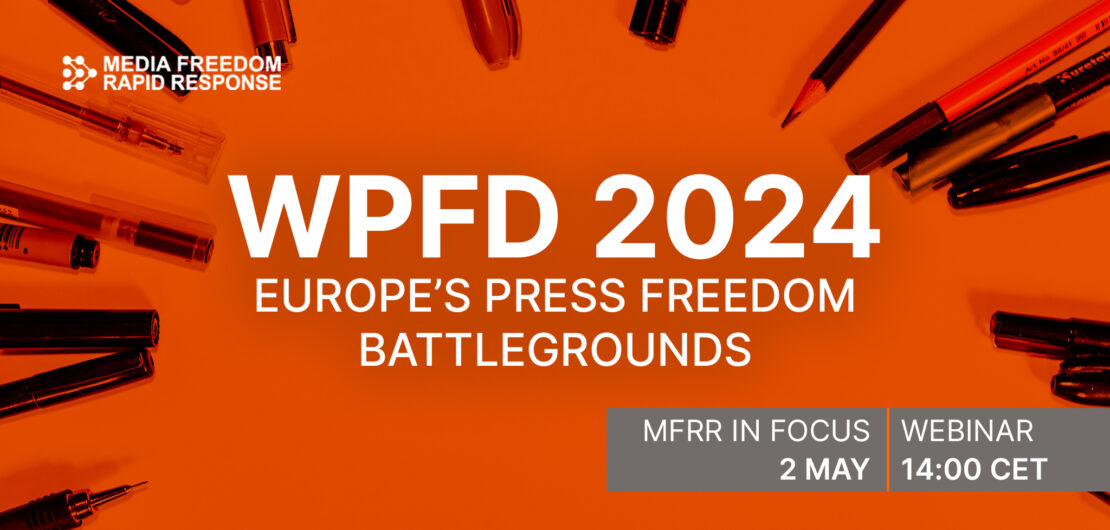 Event
Event






